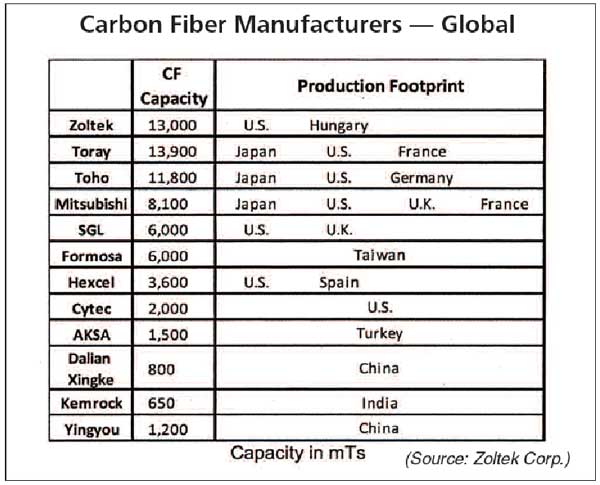By Richard McCormack
Originally published in Manufacturing & Technology News on July 30, 2010
***
One American company selling a widely produced global product that the U.S. government says could be used by rogue states against American national security interests has found a way around U.S. government export controls.
Zoltek Corp., a St. Louis-based manufacturer of carbon-fiber, uses its factory in Hungary to supply international customers in countries that the United States government finds objectionable. Federal export controls make it impossible for Zoltek to sell products made at the company’s U.S. factory in Abilene, Texas, to many of its foreign customers.
Historically, the use of carbon fiber was limited to aerospace applications. But that has changed as applications have expanded beyond defense. Currently, Vestas, the wind-turbine producer in Denmark, is the largest consumer of carbon fibers in the world. Zoltek’s products are used in offshore drilling pipes, sporting goods, automobile parts, compressed natural gas and hydrogen tanks and in numerous industrial applications.
Zoltek had sales of $139 million last year (down from $186 million in 2008) and is one of the world’s largest producers of carbon fiber. “Our foreign industrial users of carbon fibers are unaccustomed to and understandably intimidated by the U.S. government’s involvement in their raw materials,” says Zoltek Chief Operating Officer Karen Bomba.
The U.S. government restricts the sale of U.S. carbon fiber products produced by Zoltek based on national security, nonproliferation and anti-terrorism reasons. Yet, the U.S. government “will not use our carbon fibers in those same products,” says Bomba.
The largest growing markets for Zoltek’s products are in China and India. It also has customers in Turkey, Croatia, Russia, Thailand and Singapore. Receiving an export license from the Hungarian government to serve these customers takes less than a week. In the United States, Zoltek submits its paperwork to the Commerce Department’s Bureau of Industry and Security and waits up to 45 days for approval. Zoltek’s customers won’t wait that long.
(Credit Graph: Zoltek Corporation)
But that’s the easy part of dealing with the U.S. government. “For the U.S. license, as many as three different types of documents are required and in some cases, [our customers] have to get those documents from their local governments,” Bomba told a recent hearing of the International Trade Commission. Zoltek must provide the U.S. government with import certificates from the foreign Ministry or Department of Commerce; a so-called US BIS-711; end-user certificates; and a letter of assurance from non-proliferation countries.
“For Hungarian licenses, the only thing that’s required is an end-user statement,” says Bomba.
But Hungary has made it even easier for Zoltek to export from its factory there to fast-growing markets. It has adopted a “global export license,” which reduces the amount of time it takes Zoltek to deal with paperwork from a week to nothing.
“As a result of the more cumbersome processes in the U.S., Zoltek ships to customers from Hungary when licenses are required,” says Bomba. “That means we produce in Hungary instead of the U.S. and we ship from Hungary versus losing the sale. Conversely, South Korea requires a license from Hungary and does not require a license from the U.S., so we ship from the United States” to customers in Korea.
The United States regulates sales of Zoltek’s U.S.-manufactured products to China, India, Taiwan and Turkey, yet all of those countries have carbon fiber production. “We have specifically had potential customers in China choose to buy carbon fiber from local Chinese producers, notably Yingyou Group and Dalian Ziangke, rather than complete the required U.S. export paperwork for sampling our fibers,” says Bomba.
“We have also seen customers in China import carbon fiber from Formosa in Taiwan with little or no regulatory oversight from the Chinese or Taiwanese government. The U.S. export regulations put Zoltek’s U.S. operations at a disadvantage to all other carbon fiber manufacturers in the world.”
Bomba recommends that the Bureau of Industry and Security re-examine all of its export regulations related to carbon fiber applications in industrial markets. It wants the U.S. to allow it to supply samples of its products to potential customers without having to obtain an export license. It recommends an acceleration of all export license applications, and it would like the U.S. government to create a “Global Export License” similar to the one used by the Hungarian government.
———-
***Posted on August 24th, 2010




